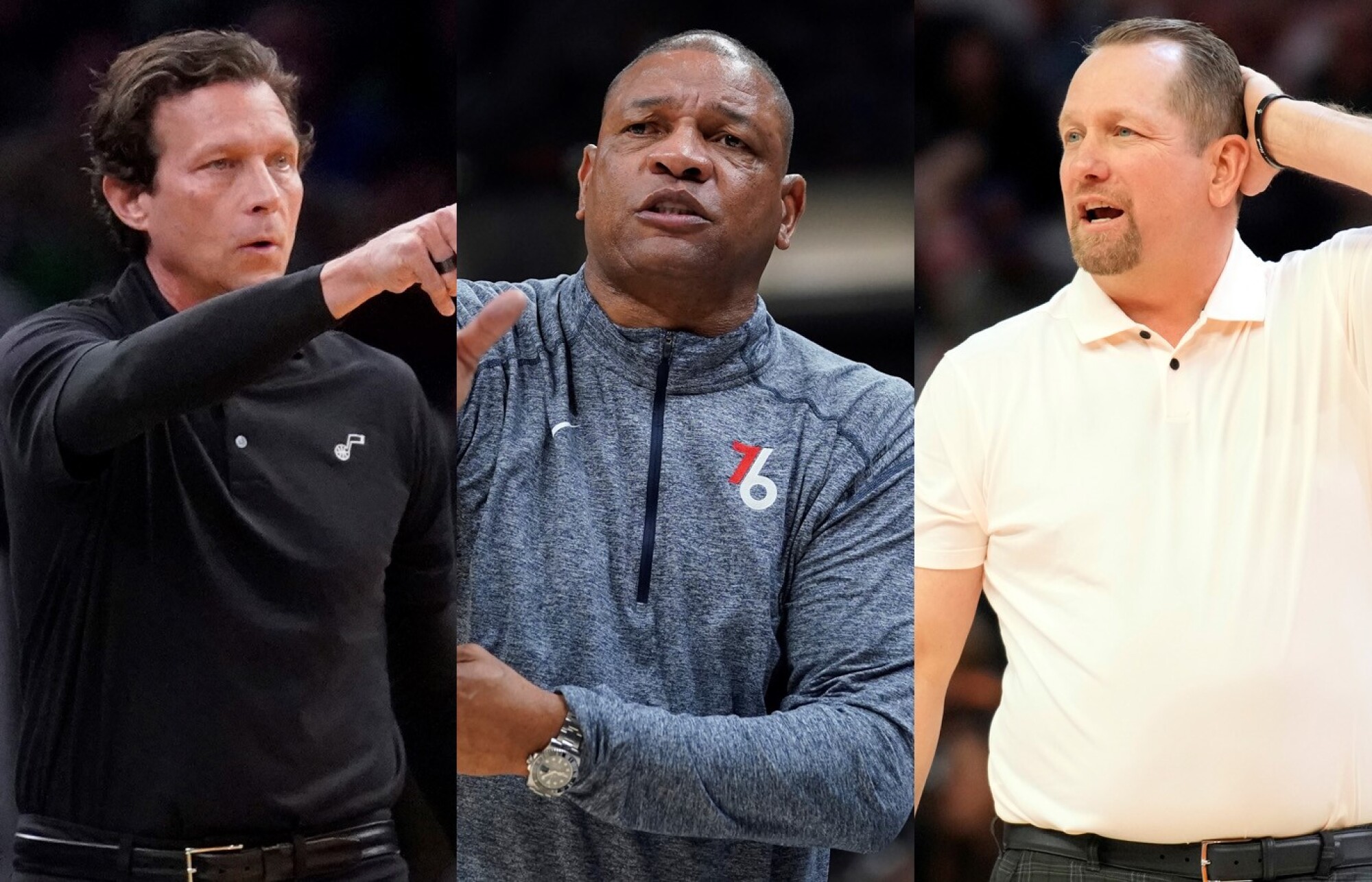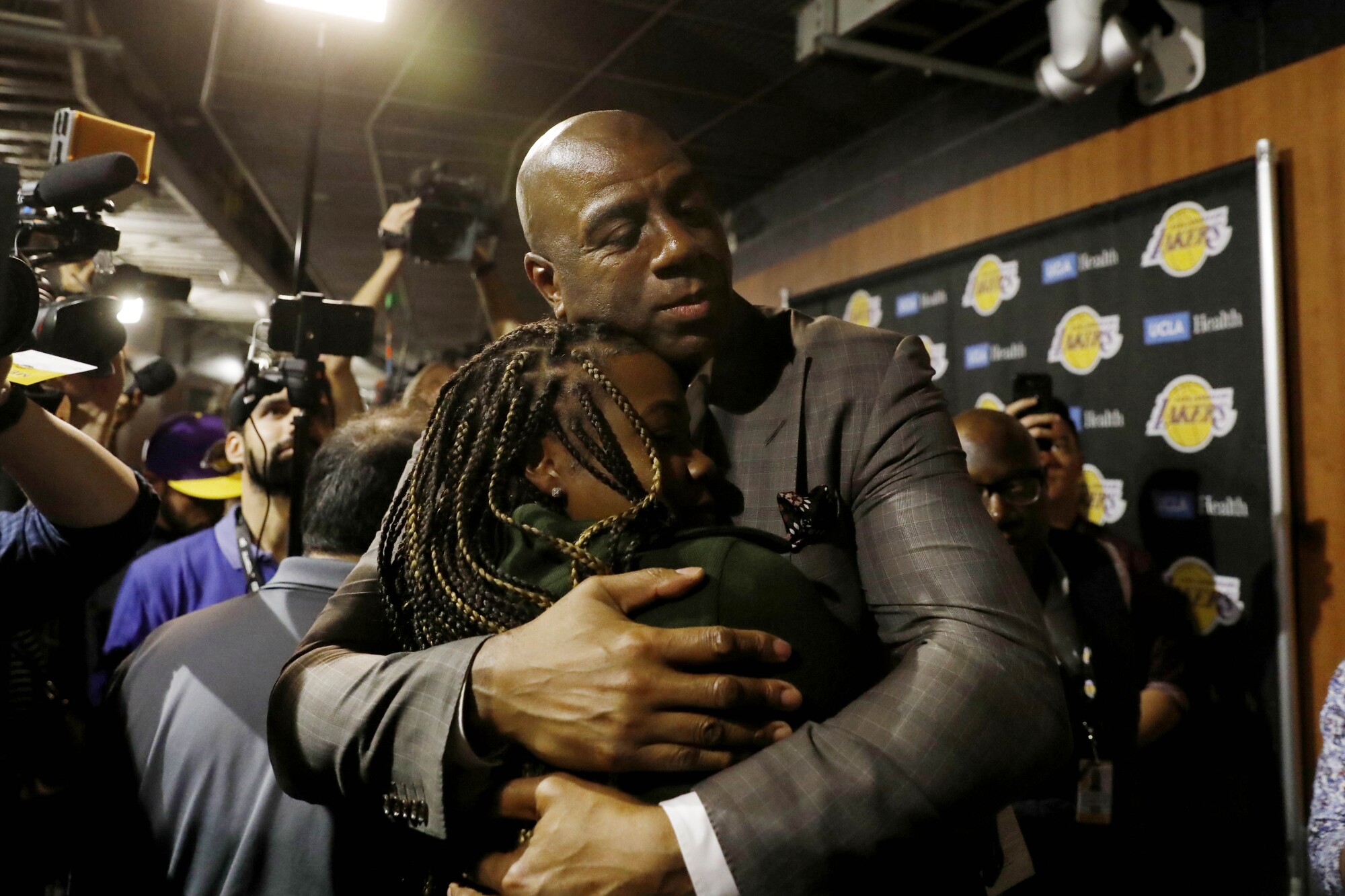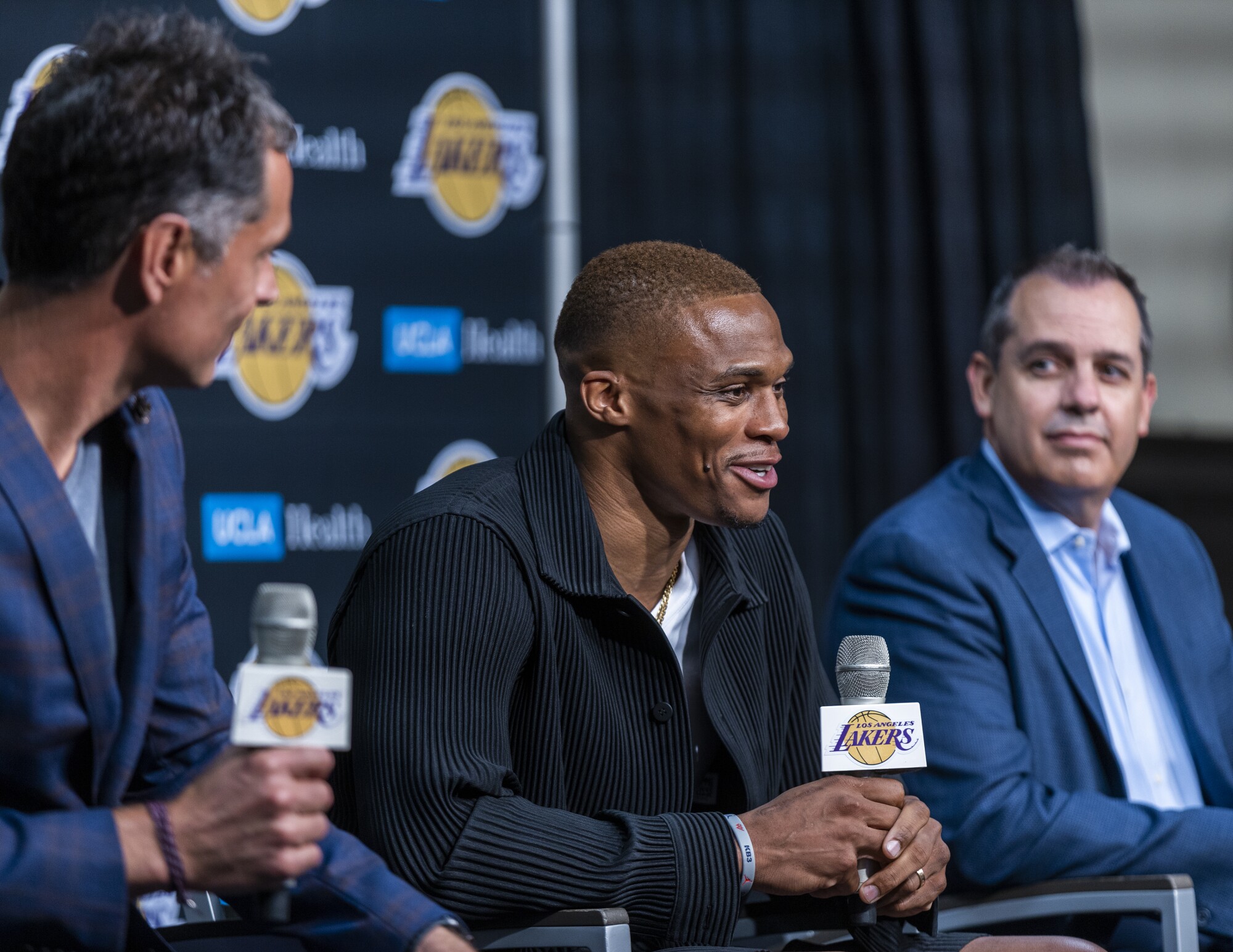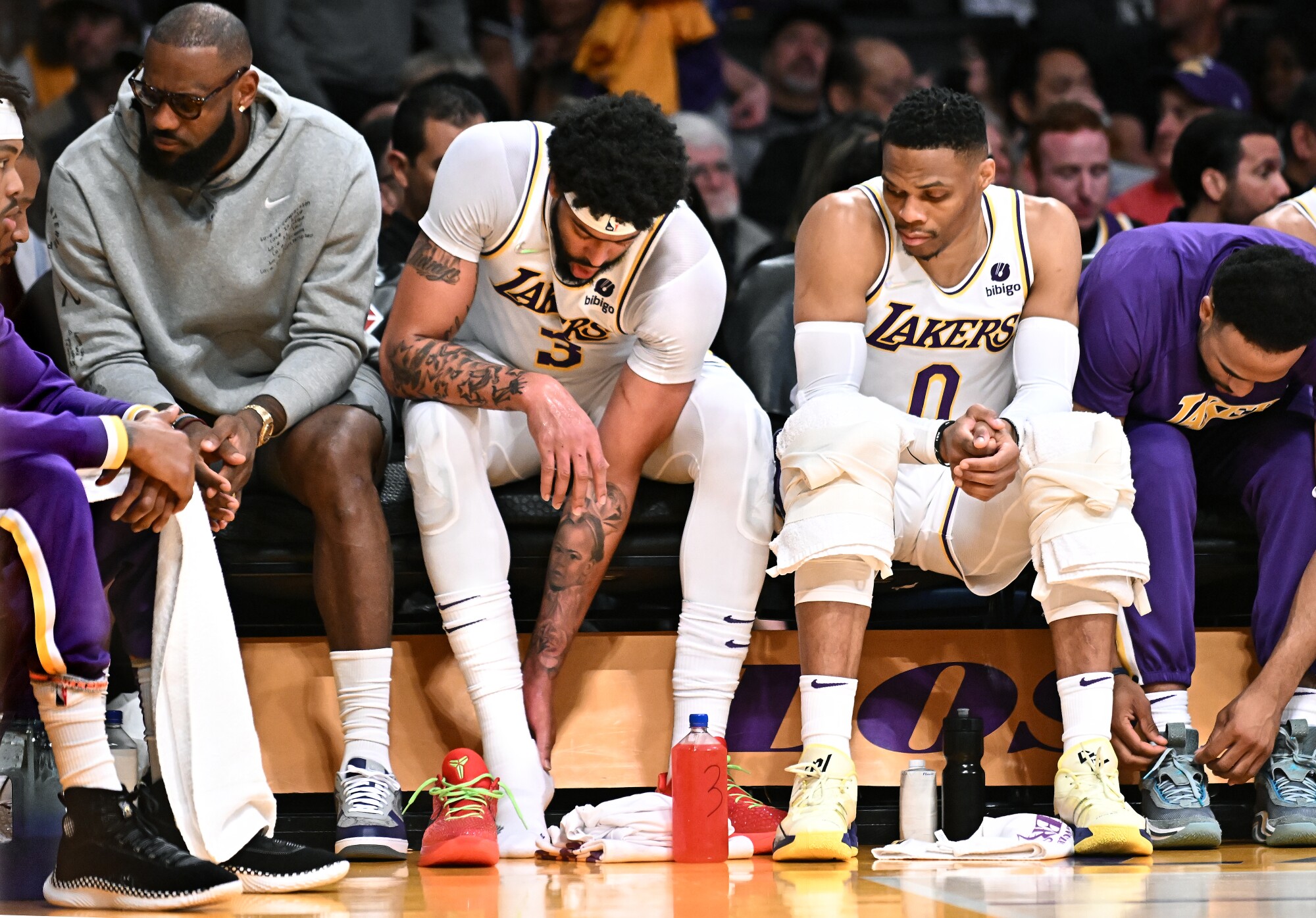Inside the Lakers coaching search: Will they learn from problems of the past?
This wasn’t the purple-and-gold style of the Lakers‘ “Showtime” excess. This jacket was two other colors — black and blacker.
Rob Pelinka, his salt-and-pepper stubble conferring an additional shade of graveness, wore it Monday as he talked about the first big decision of the Lakers’ offseason — the firing of coach Frank Vogel.
“We expressed gratitude for the three years of being able to work together with a capacity of trust and collective mindset and collaboration,” Pelinka said, “and just let him know it was a point in the Lakers history where we felt like it was time for a change in our leadership voice.
“And those are difficult things to do.”
In the grand scheme of the Lakers’ offseason, though, letting go the coach was the easy part. Finding someone who can better lead them than Vogel, who won an NBA championship two seasons ago, won’t be easy.
The ruins of the Lakers’ season still fresh in his memory, Pelinka laid out the plan for this search amid controversy in how the team handled Vogel’s firing, the news leaking on social media moments after the final game of the season.
“Is the Lakers’ job that attractive?” I’m not so sure it is. But someone will take the job for sure.”
— Coach’s agent speaking on condition of anonymity
“We just felt like it was time for a new voice,” Pelinka said. “And that’s not to say anything against the incredible accomplishments that Frank Vogel’s had. He was a great coach here and he’s going to go on to be a great coach somewhere else. We just felt like it was time for a new leader.”
Now the Lakers are back in an all-too-familiar position, facing a massive decision surrounded by other enormous questions. Three years ago they were hiring a coach in the wake of Magic Johnson’s surprise resignation as team president of basketball operations. Now they’re fighting an image problem around the NBA and a leveraged future with LeBron James, the ultimate win-now player, getting older and, seemingly, more susceptible to injuries.
“There’s just so much optimism thinking about where we are as a franchise right now,” Pelinka said on May 20, 2019. The Lakers had just hired Vogel after a dramatic coaching search and no one could share that optimism.
Today, the Lakers face the same challenges as they try to find some goodwill after a 49-loss season and Vogel’s embarrassing exit.
Those in the league with knowledge of the situation expect Toronto’s Nick Nurse, Philadelphia’s Doc Rivers and Utah’s Quin Snyder to be candidates should they become available. Former Portland coach Terry Stotts, former Oklahoma City coach Scott Brooks, former Lakers coach Mike Brown and Utah assistant Alex Jensen also might be considered. Same for Juwan Howard, who interviewed in 2019, although sources told The Times that his intention is to continue coaching Michigan, where two of his sons play.

Lakers coaching candidates are likely to include (from left) Quin Snyder, Doc Rivers and Nick Nurse.
(Associated Press)
The big question is, who can they get?
Those with knowledge of coaching situations around the league say the Lakers’ reputation isn’t good — concerns about meddling, too many voices, suspect contracts and obvious roster problems creating an equation that has them working from behind.
“Is the Lakers’ job that attractive?” one coaching agent asked, speaking on condition of anonymity because of the sensitive subject. “I’m not so sure it is. But someone will take the job.”
It is, after all, the Lakers, a marquee franchise that is the heartbeat for so much of Southern California. The weather is great and the legacy can be too — the chance to work for the same franchise as Bill Sharman, Pat Riley and Phil Jackson. At the most base level, there are only 30 jobs to be a coach in the NBA, and scarcity can make people compromise.
It’s not impossible for the Lakers to get their guy.
Three years ago, they ultimately chose Vogel — a winning coach, a gifted teacher and a steadying presence.
But if Vogel was a good enough choice for Pelinka and the Lakers, they wouldn’t be in this spot again so quickly.
So, here they go again.
After the Lakers fired Luke Walton, days after Johnson resigned in a shocking, impromptu news conference outside the locker room on the season’s final day, the Lakers were on shaky ground.
James had just finished his first season as a Laker, missing the playoffs for the first time since 2005 while playing alongside the organization’s future — young players drafted by the Lakers who would be sacrificed later that summer to acquire Anthony Davis.
The day the team officially cut ties with Walton, two names quickly pushed to the front of the organizational wish list — Monty Williams and Tyronn Lue. Howard, then a Miami assistant, also was viewed as a candidate, though not on the same level as the two former NBA coaches. Jason Kidd also scored an early interview.
Williams had worked with James as an assistant coach on Team USA. Lue proved that he could win a title with James, the two guiding Cleveland to a championship in 2016.
If there were questions about the candidates, there were equally big questions about the team. Johnson’s resignation and subsequent claims of back-stabbing made the Lakers look unstable. League insiders thought James and his agent, Rich Paul, soon could have even greater influence with Johnson gone.

Magic Johnson hugs a friend after announcing he’d be resigning as Lakers president of basketball operations in April 2019.
(Gary Coronado / Los Angeles Times)
And even if the Lakers were able to trade for Davis, could they make a play for another top star like Kawhi Leonard?
Soon, people with knowledge of the situation said there were grumblings about the front office‘s input on staffing decisions and, perhaps, strategy.
Williams surprised the organization by accepting the coaching job with the Phoenix Suns, who weren’t close to being the NBA title favorites that they are today. It allowed the Lakers to focus on Lue, a beloved former Laker with the most experience coaching James.
All signs pointed toward the Lakers hiring Lue, but the negotiations became contentious. Money and contract length were at issue. And, to a lesser extent, so was staffing.
It was the rare time when reports of the sides “finalizing a deal” didn’t end with a deal.
The Lakers were shorter on years and cash than Lue expected. The team also wanted him to have former head coaches on his staff. The Lakers suggested Vogel, whom Lue was interested in working with. They also pitched Kidd, who had no previous relationship with Lue.
First, Lue balked. Then, as discussions haplessly continued into the next day, the Lakers pulled out.
People with knowledge of the situation said Lue was offered a three-year deal worth $18 million, a contract length commonly used for first-time coaches. A year later, the Clippers would give Lue a five-year deal worth $35 million to replace Doc Rivers.
The Lakers quickly regrouped and cast a wider net for candidates, including Vogel, Kidd and Lionel Hollins, each a former coach. The team hired Vogel three days after the fallout with Lue. Kidd and Hollins ended up on his staff.

Russell Westbrook, center, is flanked by Lakers GM Rob Pelinka, left, and coach Frank Vogel while addressing the media during his introductory news conference in August.
(Allen J. Schaben / Los Angeles Times)
Seventeen months later, after a season that included tragedy and a shutdown forced by a pandemic, Vogel celebrated into the early morning hours as an NBA champion.
That title couldn’t protect him from being fired two disappointing seasons later.
“We’ll put the work behind it to make sure that’s the case. … That’s what our fans expect.”
— Rob Pelinka, Lakers GM on finding a new coach and rebuilding an aging roster
Last Monday, Pelinka articulated the opening lines of his job description for the new Lakers coach when he was asked what qualities he wanted. After saying his answer wasn’t intended to be viewed as a shot at Vogel, Pelinka made the case for a more forceful coach.
“In terms of what this team needs right now, we feel like with, obviously, superstars on our team, we want a strong voice that’s able to inspire the players to play at the highest level of competition every night,” Pelinka said. “And I think that’s going to be one of the resounding qualities that we look for in terms of holding everybody from the top player on our team to the 15th man to a degree of accountability. And that’s going to be one of the many characteristics that I think jumps out today.”
Making a move quickly isn’t a priority, he said.
”We want to find the right person. I think that’s the most important thing,” Pelinka said. “I think all things considered, it would be great to have someone in place by the draft. But our process will be thorough and methodical, and we haven’t even begun to put together a list, or discuss who the replacement is.”
The last time the Lakers were in this spot after firing Walton, it took them a month to find his replacement. This time, the expectation is that the Lakers will see who is available as the playoffs unfold, their top options still coaching teams under long-term contracts.
Just like in 2019, there’s roster uncertainty — a host of draft picks already traded away and a trio of superstars that were either injured or struggling to find a winning formula with their co-stars.

Lakers star Anthony Davis, center, holds his ankle as he’s flanked on the bench by an injured LeBron James, left, and Russell Westbrook.
(Wally Skalij / Los Angeles Times)
There again are concerns about front-office influence in staffing and decision-making. Following lost revenues from the pandemic, a meager one-year extension for Vogel and a refusal to go deeper into the luxury tax to keep Alex Caruso last offseason in free agency, some people with knowledge of the situation have financial concerns.
It’ll be on Pelinka and other members of Lakers management, including co-owner Jeanie Buss, to ease those concerns.
Asked on Monday if he was worried the fallout of Vogel’s firing would harm the Lakers, Pelinka projected extreme confidence.
“The Lakers franchise is one of the most respected in all of sports across the globe and I think that will remain to be the case,” he said. “And we’ll put the work behind it to make sure that’s the case. Because again, that’s what our fans expect.”
Now, the Lakers have to find a way to deliver.
For all the latest Sports News Click Here
For the latest news and updates, follow us on Google News.

